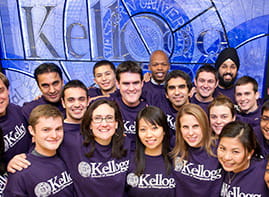12/16/2014 -
Editor's note: In the Start Me Up series, the Kellogg School spotlights young members of the Kellogg community who are bringing bold entrepreneurial visions to life.
As is the case with many great ideas, David Hegarty’s
Fixed app came during a moment of personal frustration.
The Dublin, Ireland, native lives in San Francisco, where he managed to accumulate four parking tickets over a few weeks last year.
“I decided to pay them one morning, and when I came back to my car, there were two more,” Hegarty, 36, says. “At that point I was livid. San Francisco is pretty ruthless with the ticketing.”
An entrepreneur-in-residence at Palo Alto-based venture capital firm Merus Capital, Hegarty was mulling over ideas for a new startup when he mentioned his ticket frustrations to a friend.
“He said, ‘Dude, why don’t you turn that into an iPhone app?’” Hegarty says. “I took that idea and I ran with it.”
And so began Fixed, an iOS-only app designed to take the heavy lifting out of contesting parking tickets in San Francisco. Anyone who gets a ticket in the city simply needs to take a photo of the citation and submit it through the downloaded Fixed app. The Fixed team, in turns, drafts a letter to contest the ticket and submits it to the city.
Fixed makes money by charging users 25 percent of the cost of the ticket if they overturn it successfully. If they fail to overturn it, there’s no financial obligation to Fixed — the user must simply pay the ticket to the city.
Hegarty started work on Fixed last November. The app’s Internet landing page went “viral” two months later, he says.
“Before we knew it, we had about 25,000 signups and NPR called us for an interview,” Hegarty says. “That was when the app went live, and it has been growing its user base ever since.”
An evolved process
In the initial version of Fixed, Hegarty used a less-refined, more subjective process to fight parking tickets that he called “an appeal to fairness.” He soon realized, however, that the company’s future success hinged upon the ability to combat tickets using legally legitimate means.
“The art of persuasion is essential for any business owner big or small,” Hegarty said, “and that’s a tool I definitely picked up while at Kellogg.”
Last December, the company hired a user advocate with legal experience to determine the legal validity of tickets. The company does not yet use licensed attorneys.
“If tickets are not properly filled out or if the street sign indicating the violation is more than a hundred feet away from the car, these are a couple things that make a ticket invalid in California,” Hegarty says.
Even if a user submits a ticket the company feels it will not be able to overturn, the user still gets the final decision as to whether Fixed should fight it. The company will, however, inform the user in advance that the fight might be futile.
“The reason someone contests a ticket is not necessarily the reason they win,” Hegarty says. “The average person isn’t aware of all the pages and pages of regulations that make a ticket valid. We always encourage someone to submit their ticket anyway because we know the reasons the ticket could be dismissed.”
A growing startup
Fixed has about 40,000 unique signups, contesting about 600 tickets every week. Hegarty says the company’s current success rate in challenging tickets is between 20 and 30 percent. Before the app, only about 5 percent of tickets were contested in San Francisco, with about a 30 percent overturn rate.
Fixed only operates in San Francisco right now, but Hegarty says the company’s expansion plan will put the company in several cities by the first quarter of next year and 100 by the end of 2015. The app will also be available for Android users sometime next year.
Right now, Fixed operates with a staff of 12 in a downtown San Francisco office. But the company is constantly hiring to keep up with what Hegarty calls “an explosive demand.”
“It’s off the charts. We have people begging for us to come to several cities,” he says. “Even in San Francisco, we struggle to keep up with the users we have here.”
Read more in the Start Me Up series:






